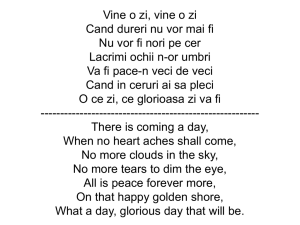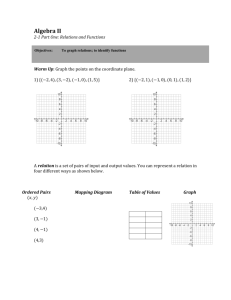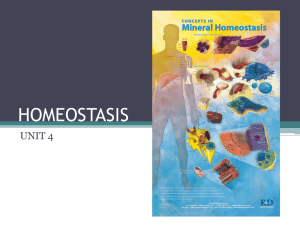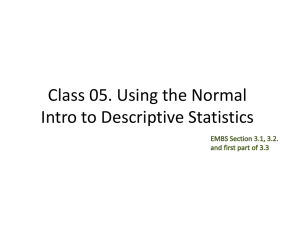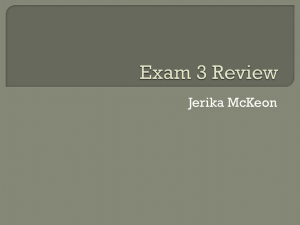2. Technical incident during the vote counting on 25/6/2009
advertisement
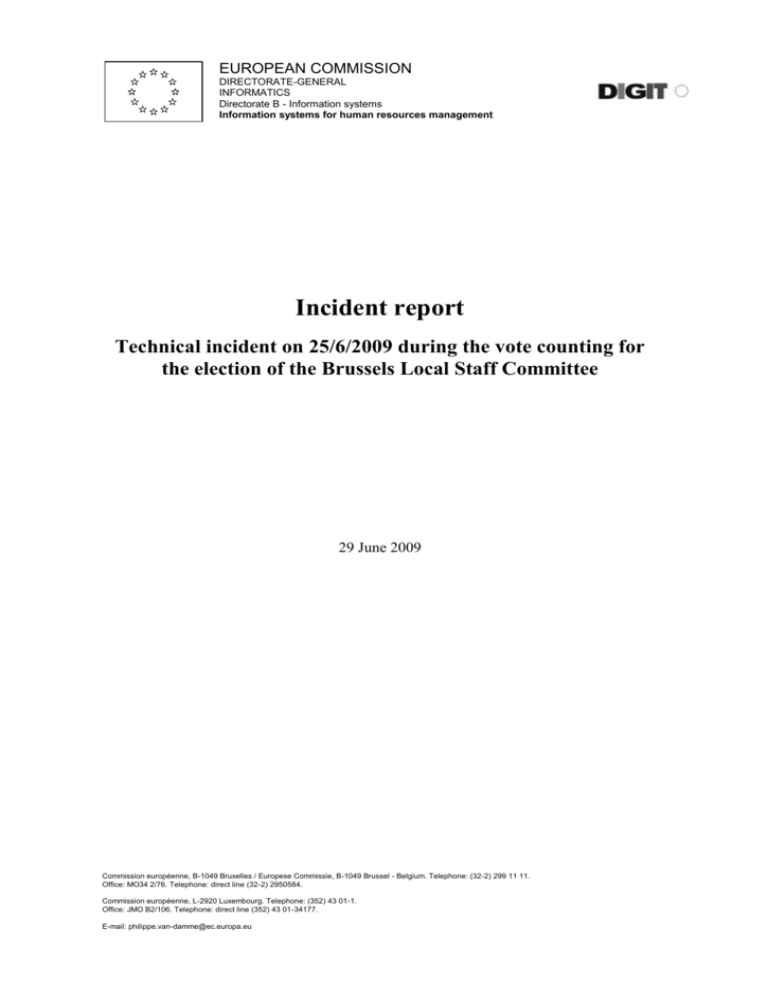
EUROPEAN COMMISSION
DIRECTORATE-GENERAL
INFORMATICS
Directorate B - Information systems
Information systems for human resources management
Incident report
Technical incident on 25/6/2009 during the vote counting for
the election of the Brussels Local Staff Committee
29 June 2009
Commission européenne, B-1049 Bruxelles / Europese Commissie, B-1049 Brussel - Belgium. Telephone: (32-2) 299 11 11.
Office: MO34 2/76. Telephone: direct line (32-2) 2950584.
Commission européenne, L-2920 Luxembourg. Telephone: (352) 43 01-1.
Office: JMO B2/106. Telephone: direct line (352) 43 01-34177.
E-mail: philippe.van-damme@ec.europa.eu
1.
OVERVIEW OF THE ELECTRONIC VOTING PROCESS
The e-Vote system that supports the electronic voting process for the elections of the
local staff committees consists of several modules. The first module is the voting module,
in which the electors express their vote. Votes are stored in an encrypted database.
Once the voting stage is completed, the votes must be counted. The actual counting is
performed by the counting module, but first all votes need to be transferred from the
voting module to the counting module. This is a multi-step process:
Firstly, the votes are decrypted by the decryption module. They are stored
separately from the original encrypted votes that remain available untouched
The decrypted votes are then exported to a flat file in the specific format expected
by the counting module (a sequence of 0s and 1s as explained below)
This flat file containing the decrypted votes is then loaded into the counting
module
Finally, the counting module counts the votes and calculates the result of the
election
2.
TECHNICAL INCIDENT DURING THE VOTE COUNTING ON 25/6/2009
On 25/6/2009 at 17h30 the voting stage of the election of the Brussels Local Staff
Committee was completed and access to the voting application was closed. As the
quorum was reached, the counting procedure was started, under the supervision of the
electoral office. Note that at each step of the counting process, backups were made of the
database to assure the traceability and the repeatability of the entire process.
It was verified that the number of registered votes, 15177, corresponded exactly to the
number staff members having expressed their vote. All votes were indeed registered
properly, without any loss of votes.
The 15177 encrypted votes were then decrypted without any problem.
Subsequently, the decrypted votes were exported to a flat file with the export module.
However, the counting application refused to load this export file as it did not correspond
to the expected input format.
DIGIT examined the problem and discovered the bug in the export module causing the
problem. A correction to the export module was applied and the counting process
resumed where it had blocked earlier in the evening.
The new export file produced by the corrected exported module was accepted by the
counting module without any problem and the results of the election were made
available.
Note that the counting module was not changed in any way. The counting module ran
without any problems as soon it was presented with an export file in the correct format.
2
The whole counting process was repeated on Friday 26th June before the electoral office
and gave identical results. At no moment in time any incorrect results were ever
produced. Neither has there ever been any issue with the vote registration. All votes were
registered properly, without any loss of votes.
The technical incident on the 25th June was limited to the export mechanism of the
decrypted votes. Due to a bug, the technical format of the export file was not in line with
the expectations of the counting module so that the upload of the votes could not take
place. Once this problem was corrected, the counting process resumed without any
problem. The only impact of the technical incident was an unscheduled delay of several
hours in the counting process during the evening of the 25th June 2009.
3.
CAUSE OF THE INCIDENT – TECHNICAL DETAILS
The export module consists of a single PL/SQL stored procedure. The purpose of the
export module is to produce, based on the decrypted votes in the database, a text file in a
specific format that can be parsed by the counting module.
The export module was redeveloped since the 2005 elections of the Brussels Local Staff
Committee as the old module experienced a severe and fundamental performance issue. It
ran for more than one hour and a half during the last elections in 2005. The new version
is based on a different algorithm and was re-written in PL/SQL. It now only takes a few
seconds to complete an export of the 15177 registered votes.
However, it was in this new export module that a technical problem occurred during the
counting process of the 2009 elections.
The problem was located in the export of the preferential votes. The export module's
PL/SQL procedure stores in a string variable the Candidates’ and List’s IDs in the order
expected by the Counting module i.e.:
,737,736,735,734,733,732,731,730,729,728,727,726,725,724,723,722,72
1,720,719,718,717,716,715,714,713,712,711,710,000,000,000,000,000,7
60,759,758,757,756,755,754,753,752,751,750,749,748,747,746,745,744,
743,742,741,740,739,738,788,787,786,785,784,783,782,781,780,779,778
,777,776,775,774,773,772,771,770,769,768,767,766,765,764,763,762,76
1,816,815,814,813,812,811,810,809,808,807,806,805,804,803,802,801,8
00,799,798,797,796,795,794,793,792,791,790,789,844,843,842,841,840,
839,838,837,836,835,834,833,832,831,830,829,828,827,826,825,824,823
,822,821,820,819,818,817,872,871,870,869,868,867,866,865,864,863,86
2,861,860,859,858,857,856,855,854,853,852,851,850,849,848,847,846,8
45,900,899,898,897,896,895,894,893,892,891,890,889,888,887,886,885,
884,883,882,881,880,879,878,877,876,875,874,873,928,927,926,925,924
,923,922,921,920,919,918,917,916,915,914,913,912,911,910,909,908,90
7,906,905,904,903,902,901,
Then the program starts reading the decrypted votes sequentially from the VOTES table
in the database. Suppose that there is a preferential vote for candidates 711 and 713, the
export module will replace in the above variable the candidate IDs 711 and 713 for which
a preferential vote has been expressed with a # symbol so the string becomes
,737,736,735,734,733,732,731,730,729,728,727,726,725,724,723,722,72
1,720,719,718,717,716,715,714,#,712,#,710,000,000,000,000,000,760,7
59,758,757,756,755,754,753,752,751,750,749,748,747,746,745,744,743,
742,741,740,739,738,788,787,786,785,784,783,782,781,780,779,778,777
3
,776,775,774,773,772,771,770,769,768,767,766,765,764,763,762,761,81
6,815,814,813,812,811,810,809,808,807,806,805,804,803,802,801,800,7
99,798,797,796,795,794,793,792,791,790,789,844,843,842,841,840,839,
838,837,836,835,834,833,832,831,830,829,828,827,826,825,824,823,822
,821,820,819,818,817,872,871,870,869,868,867,866,865,864,863,862,86
1,860,859,858,857,856,855,854,853,852,851,850,849,848,847,846,845,9
00,899,898,897,896,895,894,893,892,891,890,889,888,887,886,885,884,
883,882,881,880,879,878,877,876,875,874,873,928,927,926,925,924,923
,922,921,920,919,918,917,916,915,914,913,912,911,910,909,908,907,90
6,905,904,903,902,901,
After that, the export module replaces the remaining numbers by 0s through a simple
pattern matching operation.
,0,0,0,0,0,0,0,0,0,0,0,0,0,0,0,0,0,0,0,0,0,0,0,0,#,0,#,0,0,0,0,0,0,
0,0,0,0,0,0,0,0,0,0,0,0,0,0,0,0,0,0,0,0,0,0,0,0,0,0,0,0,0,0,0,0,0,0
,0,0,0,0,0,0,0,0,0,0,0,0,0,0,0,0,0,0,0,0,0,0,0,0,0,0,0,0,0,0,0,0,0,
0,0,0,0,0,0,0,0,0,0,0,0,0,0,0,0,0,0,0,0,0,0,0,0,0,0,0,0,0,0,0,0,0,0
,0,0,0,0,0,0,0,0,0,0,0,0,0,0,0,0,0,0,0,0,0,0,0,0,0,0,0,0,0,0,0,0,0,
0,0,0,0,0,0,0,0,0,0,0,0,0,0,0,0,0,0,0,0,0,0,0,0,0,0,0,0,0,0,0,0,0,0
,0,0,0,0,0,0,0,0,0,0,0,0,0,0,0,0,0,0,0,0,0,0,0,0,0,0,0,0,0,0,0,0,0,
Finally the #s are replaced with 1s and the line representing the preferential votes of one
voter is ready. It is a sequence of zeros and ones, with the ones corresponding to a
preferential vote.
,0,0,0,0,0,0,0,0,0,0,0,0,0,0,0,0,0,0,0,0,0,0,0,0,1,0,1,0,0,0,0,0,0,
0,0,0,0,0,0,0,0,0,0,0,0,0,0,0,0,0,0,0,0,0,0,0,0,0,0,0,0,0,0,0,0,0,0
,0,0,0,0,0,0,0,0,0,0,0,0,0,0,0,0,0,0,0,0,0,0,0,0,0,0,0,0,0,0,0,0,0,
0,0,0,0,0,0,0,0,0,0,0,0,0,0,0,0,0,0,0,0,0,0,0,0,0,0,0,0,0,0,0,0,0,0
,0,0,0,0,0,0,0,0,0,0,0,0,0,0,0,0,0,0,0,0,0,0,0,0,0,0,0,0,0,0,0,0,0,
0,0,0,0,0,0,0,0,0,0,0,0,0,0,0,0,0,0,0,0,0,0,0,0,0,0,0,0,0,0,0,0,0,0
,0,0,0,0,0,0,0,0,0,0,0,0,0,0,0,0,0,0,0,0,0,0,0,0,0,0,0,0,0,0,0,0,0,
It is important to note that the export module has been tested several times in the test
environment. In this test environment the Candidates’ and Lists’ IDs have also been
loaded multiple times. As the IDs of the lists and the candidates are attributed
automatically through the Oracle sequence mechanism, each test increased the range of
Candidates’ and Lists’ IDs. In other words, these IDs did not restart at 10 with each test
(min value of sequence SEQ_CLP_CANDIDATES), but they simply increased with
every test. This is the normal behavior of the Oracle database that assures the uniqueness
of the primary keys through the sequence mechanism.
For the final (and successful tests) the IDs were in the range of 710 to 930. However, in
the production environment the database was created from scratch which implies that the
Oracle sequences were also initialized. The IDs attributed to the candidates in the
production environment were in a range between 10 and 230.
If we apply the same algorithm as explained above on IDs in this lower range, a problem
occurs.
Consider the following example of a string variable with the list of IDs in the order
expected by the counting module for the production environment (i.e. with the lower
range of IDs):
4
37,36,35,34,33,32,31,30,29,28,27,26,25,24,23,22,21,20,19,18,17,16,1
5,14,13,12,11,10,000,000,000,000,000,60,59,58,57,56,55,54,53,52,51,
50,49,48,47,46,45,44,43,42,41,40,39,38,88,87,86,85,84,83,82,81,80,7
9,78,77,76,75,74,73,72,71,70,69,68,67,66,65,64,63,62,61,116,115,114
,113,112,111,110,109,108,107,106,105,104,103,102,101,100,99,98,97,9
6,95,94,93,92,91,90,89,144,143,142,141,140,139,138,137,136,135,134,
133,132,131,130,129,128,127,126,125,124,123,122,121,120,119,118,117
,172,171,170,169,168,167,166,165,164,163,162,161,160,159,158,157,15
6,155,154,153,152,151,150,149,148,147,146,145,200,199,198,197,196,1
95,194,193,192,191,190,189,188,187,186,185,184,183,182,181,180,179,
178,177,176,175,174,173,228,227,226,225,224,223,222,221,220,219,218
,217,216,215,214,213,212,211,210,209,208,207,206,205,204,203,
Suppose that there is a preferential vote for candidate 19, the export module would
normally replace in the above string the position 19 with a # symbol so that the string
becomes:
37,36,35,34,33,32,31,30,29,28,27,26,25,24,23,22,21,20,#,18,17,16,15
,14,13,12,11,10,000,000,000,000,000,60,59,58,57,56,55,54,53,52,51,5
0,49,48,47,46,45,44,43,42,41,40,39,38,88,87,86,85,84,83,82,81,80,79
,78,77,76,75,74,73,72,71,70,69,68,67,66,65,64,63,62,61,116,115,114,
113,112,111,110,109,108,107,106,105,104,103,102,101,100,99,98,97,96
,95,94,93,92,91,90,89,144,143,142,141,140,139,138,137,136,135,134,1
33,132,131,130,129,128,127,126,125,124,123,122,121,120,119,118,117,
172,171,170,169,168,167,166,165,164,163,162,161,160,159,158,157,156
,155,154,153,152,151,150,149,148,147,146,145,200,199,198,197,196,19
5,194,193,192,191,190,189,188,187,186,185,184,183,182,181,180,179,1
78,177,176,175,174,173,228,227,226,225,224,223,222,221,220,219,218,
217,216,215,214,213,212,211,210,209,208,207,206,205,204,203,
However, instead of replacing the candidate 19 with the #, the program was replacing all
instances of 19 with #. So, for example, 190 was also changed to #0 and the string
became:
37,36,35,34,33,32,31,30,29,28,27,26,25,24,23,22,21,20,#,18,17,16,15
,14,13,12,11,10,000,000,000,000,000,60,59,58,57,56,55,54,53,52,51,5
0,49,48,47,46,45,44,43,42,41,40,39,38,88,87,86,85,84,83,82,81,80,79
,78,77,76,75,74,73,72,71,70,69,68,67,66,65,64,63,62,61,116,115,114,
113,112,111,110,109,108,107,106,105,104,103,102,101,100,99,98,97,96
,95,94,93,92,91,90,89,144,143,142,141,140,139,138,137,136,135,134,1
33,132,131,130,129,128,127,126,125,124,123,122,121,120,1#,118,117,1
72,171,170,169,168,167,166,165,164,163,162,161,160,159,158,157,156,
155,154,153,152,151,150,149,148,147,146,145,200,#9,#8,#7,#6,#5,#4,#
3,#2,#1,#0,189,188,187,186,185,184,183,182,181,180,179,178,177,176,
175,174,173,228,227,226,225,224,223,222,221,220,2#,218,217,216,215,
214,213,212,211,210,209,208,207,206,205,204,203,
This was not the indented behavior, creating an output file with an incorrect format that
could not be read by the counting software.
The correction of the erroneous algorithm is simple. If the export procedure would
replace all instances of “,19,” with “,#,” instead of “19” with “#” (note the added commas
in the matching strings), the problem does not arise and the output string becomes:
37,36,35,34,33,32,31,30,29,28,27,26,25,24,23,22,21,20,#,18,17,16,15
,14,13,12,11,10,000,000,000,000,000,60,59,58,57,56,55,54,53,52,51,5
0,49,48,47,46,45,44,43,42,41,40,39,38,88,87,86,85,84,83,82,81,80,79
,78,77,76,75,74,73,72,71,70,69,68,67,66,65,64,63,62,61,116,115,114,
5
113,112,111,110,109,108,107,106,105,104,103,102,101,100,99,98,97,96
,95,94,93,92,91,90,89,144,143,142,141,140,139,138,137,136,135,134,1
33,132,131,130,129,128,127,126,125,124,123,122,121,120,119,118,117,
172,171,170,169,168,167,166,165,164,163,162,161,160,159,158,157,156
,155,154,153,152,151,150,149,148,147,146,145,200,199,198,197,196,19
5,194,193,192,191,190,189,188,187,186,185,184,183,182,181,180,179,1
78,177,176,175,174,173,228,227,226,225,224,223,222,221,220,219,218,
217,216,215,214,213,212,211,210,209,208,207,206,205,204,203,
The only difference between the incorrect and the correct algorithm is located in the
inclusion of commas in the search pattern.
However, when all ID's consists of 3 digits, exactly as was the case in the test
environment but not in the production environment, both algorithms behave identically.
In other words, the error only occurs when candidates have IDs consisting of a mix
between 2 and 3 digit numbers. This situation occured in the production environment but
not in the test environment.
This unfortunate coincidence explains why in the test environment the export program
behaved apparently correctly, while in the production environment it did not.
The correction of the export module, once the nature of the problem was understood, was
relatively simple. The code of the original and the corrected export procedures is included
in the annex at the end of this report.
The main difference is that the line
l_temp_cand_list_ordered :=
REPLACE(l_temp_cand_list_ordered,l_vote_for_cand,'#');
was replaced by the following line:
l_temp_cand_list_ordered :=
REPLACE(l_temp_cand_list_ordered,','||l_vote_for_cand||',',',#,');
Also in order to avoid that the first ID (37 in the above example) isn't counted, we needed
to add a comma before the first ID as well
,37,36,35,34,33,32,31,30,29,28,27,26,25,24,23,22,21,20,#,18,17,16,1
5,14,13,12,11,10,000,000,000,000,000,60,59,58,57,56,55,54,53,52,51,
50,49,48,47,46,45,44,43,42,41,40,39,38,88,87,86,85,84,83,82,81,80,7
9,78,77,76,75,74,73,72,71,70,69,68,67,66,65,64,63,62,61,116,115,114
,113,112,111,110,109,108,107,106,105,104,103,102,101,100,99,98,97,9
6,95,94,93,92,91,90,89,144,143,142,141,140,139,138,137,136,135,134,
133,132,131,130,129,128,127,126,125,124,123,122,121,120,119,118,117
,172,171,170,169,168,167,166,165,164,163,162,161,160,159,158,157,15
6,155,154,153,152,151,150,149,148,147,146,145,200,199,198,197,196,1
95,194,193,192,191,190,189,188,187,186,185,184,183,182,181,180,179,
178,177,176,175,174,173,228,227,226,225,224,223,222,221,220,219,218
,217,216,215,214,213,212,211,210,209,208,207,206,205,204,203,
So the line
l_temp_cand_list_ordered := l_cand_list_ordered;
6
was replaced by
l_temp_cand_list_ordered := ',' || l_cand_list_ordered;
The extra comma should be removed at the end to keep the formatting coherent with the
counting module's expectations. This is done in the third line that was added:
l_temp_cand_list_ordered :=
SUBSTR(l_temp_cand_list_ordered,2,LENGTH(l_temp_cand_list_ordered))
;
So in total two lines have been modified and one line has been inserted in the export
module during the evening of the 25th June 2009 to correct the problem. The correction
did not impact the votes. Neither did it impact the counting module.
4.
CONCLUSION
The technical incident on the 25th June was limited to the export mechanism of the
decrypted votes. It had no impact whatsoever on the voting database, neither was it linked
to the actual counting module. Due to a bug, the technical format of the export file was
different from the expectations of the counting module so that the upload of the votes
could not take place.
This problem only occurs in a situation where candidates' internal identifiers,
automatically attributed by the Oracle database sequence mechanism, do not all have the
same number of digits. By coincidence, this was only the case in the production
environment but not in the test environment. Hence the problem was never detected
before. In the test environment the export procedure behaved apparently correctly, while
in the production environment it did not.
Once the issue was corrected, the counting process resumed without any problem. The
only impact of the technical incident was an unscheduled delay of several hours in the
counting process during the evening of the 25th June 2009.
At no moment in time any incorrect results were ever produced. Neither has there ever
been any issue with the vote registration itself. All votes were registered properly,
without any loss of votes.
7
ANNEX
The code for the old and the corrected export module with highlighted differences are
given below:
Old export module
--this is a preferential vote
►l_temp_cand_list_ordered := l_cand_list_ordered;
l_temp_preferential := '';--the complete string of the preferential
vote
l_count_preferential := 0;--comma finder
l_vote_for_cand := '';-- a candidate within preferential vote
l_temp_preferential := r_vot.svotes;
l_count_preferential := INSTR(l_temp_preferential,',');
WHILE l_count_preferential > 0
LOOP
l_vote_for_cand :=
substr(l_temp_preferential,1,l_count_preferential-1);
l_temp_preferential :=
substr(l_temp_preferential,l_count_preferential+1,length(l_temp_pre
ferential));
l_count_preferential := INSTR(l_temp_preferential,',');
►l_temp_cand_list_ordered :=
REPLACE(l_temp_cand_list_ordered,l_vote_for_cand,'#');
END LOOP;
l_temp_cand_list_ordered :=
REGEXP_REPLACE(l_temp_cand_list_ordered,'[0-9]{1,}','0');
l_temp_cand_list_ordered :=
REPLACE(l_temp_cand_list_ordered,'#','1');
l_thisvote := l_temp_cand_list_ordered;
Corrected export module (difference in bold)
--this is a preferential vote
►l_temp_cand_list_ordered := ',' || l_cand_list_ordered;
l_temp_preferential := '';--the complete string of the preferential
vote
l_count_preferential := 0;--comma finder
l_vote_for_cand := '';-- a candidate within preferential vote
l_temp_preferential := r_vot.svotes;
l_count_preferential := INSTR(l_temp_preferential,',');
WHILE l_count_preferential > 0
LOOP
l_vote_for_cand :=
substr(l_temp_preferential,1,l_count_preferential-1);
l_temp_preferential :=
substr(l_temp_preferential,l_count_preferential+1,length(l_temp_pre
ferential));
l_count_preferential := INSTR(l_temp_preferential,',');
►l_temp_cand_list_ordered :=
REPLACE(l_temp_cand_list_ordered,','||l_vote_for_cand||',',',#,');
END LOOP;
l_temp_cand_list_ordered :=
REGEXP_REPLACE(l_temp_cand_list_ordered,'[0-9]{1,}','0');
l_temp_cand_list_ordered :=
REPLACE(l_temp_cand_list_ordered,'#','1');
l_temp_cand_list_ordered :=
►SUBSTR(l_temp_cand_list_ordered,2,LENGTH(l_temp_cand_list_ordered)
);
l_thisvote := l_temp_cand_list_ordered;
8
